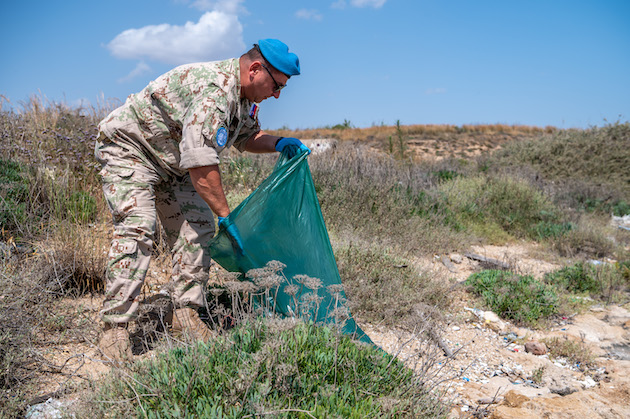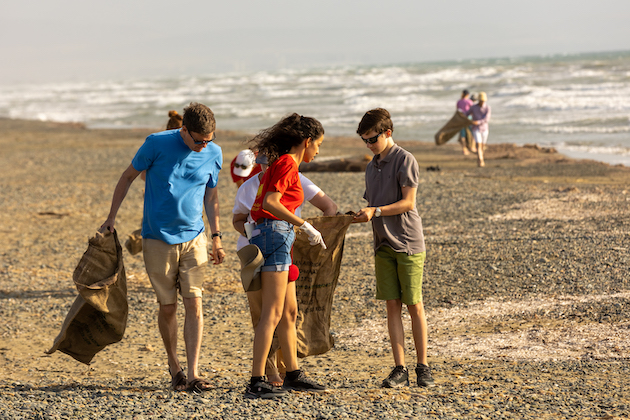UNITED NATIONS, Sep 27 (IPS) – Along the 180-kilometer-long buffer zone separating the north and south of Cyprus, there is a surprising sign of unity: recycled ammunition boxes no longer hold bullets. They are home to baby birds.
Over the past five years, United Nations police have collaborated with local authorities to place 100 boxes throughout the uninhabited border area. An alternative to harmful pesticides, the man-made nests attract barn owls who prey on rodents. By supporting these kinds of projects, United Nations peacekeepers in Cyprus are helping to facilitate conservation efforts that impact communities on both sides of the island’s divide.
The UN peacekeeping mission in Cyprus (UNFICYP) is one of the world’s oldest active missions. Following violence between Greek and Turkish Cypriots in the 1960s, Cyprus was split in 1974 into a northern third run by a Turkish Cypriot government and a southern two-thirds run by an internationally recognized Greek Cypriot government. UN forces monitor the dividing militarized buffer zone.

Fresh Tensions Persist
In August, UN peacekeepers were seriously injured by Turkish Cypriot security forces during a controversy over unauthorized construction work in an UN-controlled area, Reuters reports. According to the BBC, reunification talks remain slow.
Still, peacekeepers are trying to bring the two communities together through a shared interest in protecting the environment.
A small Mediterranean island, Cyprus is an important breeding, nesting, and foraging area for many animals. While activists say sensitivity to the importance of sustainability has increased, climate change is a greater threat than ever throughout Cyprus. Development from wealthy investors has fragmented habitats and led to the loss of natural areas.
Tourism has exacerbated water scarcity. Record high temperatures have aggravated social inequities for people who cannot afford air conditioning. Wildfires across the island have threatened to trigger minefields in the buffer zone. When everyone breathes the same air, air pollution is everyone’s problem.
“Environment doesn’t really know boundaries or borders and different nationalities,” Cyprus advocate Meryem Ozkan says. “But how we are acting, protecting, and preserving everywhere all around the island is affecting us all living on it.”
UNFICYP Senior Police Advisor Satu Koivu strives to practice environmentally responsive policing in line with UN environmental management mandates. Patrols of the buffer zone have reduced illegal waste dumping and helped curb the long tradition of bird poaching along the island’s famous bird migration routes.
Meanwhile, mission-level initiatives include installing solar panels, driving hybrid vehicles, and using reusable water bottles.
Ultimately, Koivu says supporting local people is her priority. Partnerships with local authorities, civil society organizations, and community members are essential. Communication and outreach are critical tools, especially for bringing people together.
Many kids would cringe at the thought of enduring an hour-long bus ride on a hot summer day just to spend hours collecting trash. During UN-organized beach and buffer zone clean-ups, though, youth from both the North and South of Cyprus learn to appreciate the importance of their conservation efforts while working side by side with uniformed peacekeepers. The explicit goal is to discuss environmental solutions. Peacebuilding is a happy bonus.
Ozkan, the current operations manager for the North Cyprus Society for the Protection of Turtles (SPOT), collaborated with the UN on a couple of beach clean-ups. SPOT’s sea turtle conservation project centers aim to raise awareness through firsthand experiences. “If people don’t love what you love and feel the need to protect, they will not want to put the effort in,” Ozkan said.
Ozkan sees the UN’s open community events as important platforms for NGOs from both sides to communicate on equal footing without misunderstanding. Ozkan says engagement between organizations in the north and south has become more common in the last decade. Recently, SPOT partnered with NGOs around Cyprus to collect data about when sea turtles are trapped in fishing nets and engage fishermen through outreach activities.
Youth Activists for Climate Change
Youth activists who helped coordinate Cyprus’ second Local Youth Conference on Climate Change say the UN has helped them connect with each other and a wider audience. At one UN event, their team presented a draft policy proposal to install solar panels in the buffer zone to Cyprus government officials. They welcome not only the voices of both Greek and Turkish Cypriots but the perspectives of other minority and migrant communities as well.
“There is a huge need for environmental action across the aisle at the moment,” Victoras Pallikaras, a former UNFICYP Champion for Environmental Peace, stressed. Different governmental regulations on either side of the island can make coordination and compliance a challenge. While the south follows and receives support from the European Union’s environmental directives, Pallikaras notes, the north has different policies.
“The UN is kind of a pressure for both communities to bring them back together,” Pallikaras said. Even if it’s imperfect, “the most important thing is that the UN is making a huge effort.”
At first, Nicolaos “Nikos” Kassinis, one of the Cyprus Game and Fauna Service staff responsible for coordinating the barn owl nesting project, found it strange to be escorted by foreign UN officers in his own country. Over the past years, they’ve developed a “great trust.”
“Without these people, it will be impossible to do work in the buffer zone,” he now says.
“Wildlife doesn’t recognize fences and divides that are on the map,” the conservationist emphasizes. In the future, he would like to see the barn owl project expand to include the Turkish Cypriot side of the island — pesticide residue has been found in birds of prey that travel across Cyprus.
Koivu hopes that her environmental work will help the public also associate police with positive initiatives.
“As an individual, I cannot change the world. But I can start the ball rolling, and then together, we can make this difference and impact. So, I try to be positive,” she says. Less serious, her crisp blue uniform crinkles with her grin when she emphatically talks about the magic of seeing a new owlet.
“They are so cute, these babies!”
IPS UN Bureau Report
Follow @IPSNewsUNBureau
Follow IPS News UN Bureau on Instagram
© Inter Press Service (2023) — All Rights ReservedOriginal source: Inter Press Service
Check out our Latest News and Follow us at Facebook
Original Source

